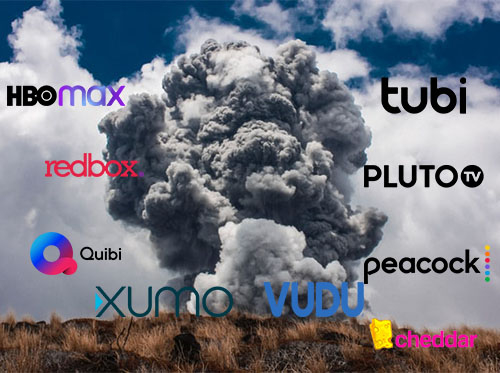Explained: Amazon (Not) Buying AMC
Since Sunday rumors swirled that Amazon was buying AMC, initiated by a story in the UK’s Daily Mail. On Monday morning AMC’s stock surged 56%, and closed at 30% above its opening price.
The M&A talks are not confirmed by either company, and we at RockWater don’t expect a deal.
But, it’s interesting to imagine the logic of a combination. Our takes:
-
A re-embrace of Universal? After Universal’s Trolls World Tour earned $100M in its first three weeks of a VOD-only release, a proud NBCU CEO Jeff Shell promised future film releases would include concurrent theatrical and VOD windows (NOTE: VOD is at 80% margin vs 50% for theaters). AMC’s CEO then announced the theater chain would no longer exhibit Universal films (funny timing, considering AMC is currently closed). An Amazon-owned AMC would likely reverse this mandate because (1) strong IP / franchises sell tickets, and Universal is one of the world’s largest IP houses (2) access to viewership and customer data from Universal movie fans and (3) Amazon would want to be in good graces with Universal to have access to its content library for its Prime Video service (though we know NBCU titles will increasingly be pulled as the Peacock VOD service ramps, so this argument is a bit flimsy).
-
Data, data, data. Amazon gets a large treasure trove of customer data; consumer buying behavior for premium titles and franchises (when / where / how), credit card info, concession purchases, # of co-viewers / family size, more. Amazon could then better program its Prime Video offering, customize optimal movie release windows on a per title basis for theatrical vs streaming, offer new products at concession stands, etc. But, Amazon’s media end game isn’t maximizing film and concession revenues per customer…instead, it’s driving sales of SVOD services like HBO and Starz via Prime Channels, and driving customer traffic to Prime marketplace. These are much bigger revenue wins. Does an AMC acquisition help here? Not materially. So, what’s another big data win? Ticketing? Could the AMC dataset and theater-customer relationship help kick-off a larger new business venture for Amazon? Feels unlikely.
-
Roll-up spree? A 1948 Supreme Court ruling bars studios from owning their own theaters due to antitrust concerns. But, in late November the Justice Department’s antitrust chief announced an intention to terminate those rules. If Amazon gets approval to buy AMC, it could spur theater chain M&A. Netflix was in talks to buy LA’s Egyptian theater in 2019 (though we haven’t seen confirmed reports of a closed deal), and then Netflix bought NY’s iconic The Paris Theatre in November – with an AMC deal, would Netflix go on the theater chain hunt? Disney is expert at IRL experiences (see theme park business) – will the house of mouse pursue more media verticalization? Considering its $1B+ of losses for 1Q 2020, Disney is likely avoiding new brick and mortar investments.
-
Lower ticket prices, bigger audiences. Amazon wins by passing savings to the customer and generating revenue across a massive consumer base. Amazon could reduce AMC ticket prices to attract larger audiences, and leverage new customer relationships to drive user acquisition for Prime Video. Amazon could also optimize concession and on-premise sales via added SKUs and new shopping experiences (e.g. Amazon Go and Whole Foods integrations). Amazon also knows how to run a lean cost structure better than most, and could likely find many cost wins relative to the OPEX bloat found under traditional Hollywood leadership.
-
If theaters are becoming streamers, then… Alamo Drafthouse, the premium indie theater chain with 40 locations, just announced Alamo On Demand, its new streaming service. Alamo is betting that its IRL reputation for quality movie curation and premium customer experience can translate into OTT success. But, it’s a competitive market considering the existing incumbents (Netflix, Amazon), more incumbent launches this spring (HBO Max, Peacock), and array of niche streamers (Criterion, MUBI, more..we actually have a theatrical client working on a DTC initiative). Even Fandango, the ticket service jointly owned by NBCU (70%) and AT&T (30%), just bought Vudu from Walmart to bolster its OTT offering. There’s a valuable customer dataset and existing studio relationships that these IRL venues and ticketing platforms can bring to a new streamer bet, so we’re not surprised at the new streamer launch activity (and yes, it’s also a matter of COVID-19 survival). Of note, Alamo Drafthouse and Fandango aren’t producing original content, so this doesn’t *seem* to violate the 1948 Supreme Court Ruling. We have no great insight on the Amazon relevance here…we simply find this an interesting marketplace development.
-
Studio negotiation leverage. Amazon works closely with Hollywood film studios via content licensing partnerships for Prime Video. By controlling the world’s largest theater chain, and with the theatrical window being a large revenue driver for film studios, Amazon could gain leverage in its deal negotiations. Amazon could benefit from more favorable revenue share terms, and even securing rights to titles that the studios may want to reserve for their own streamer bets.
Yes, the industrial logic feels flimsy to us at RockWater, even with the historical context that Amazon was also rumored to be in talks to acquire Landmark Theaters in 2018.
There’s also the issue of price.
AMC is burdened with over $10B of debt, so the price tag isn’t the $550-600M market cap…it would be 20x that. From a financial POV, a deal post bankruptcy makes much more sense. Though, unclear if the lenders would give up so much skin knowing that deep pocketed Amazon was the end buyer.
—
Ping us here at anytime. We love to hear from our readers.



